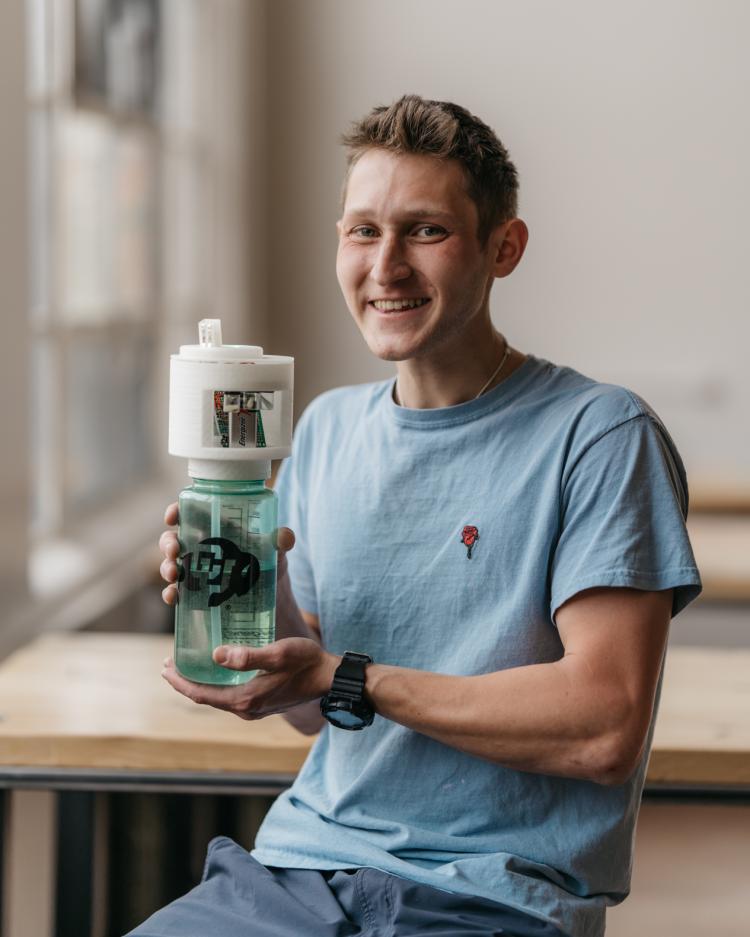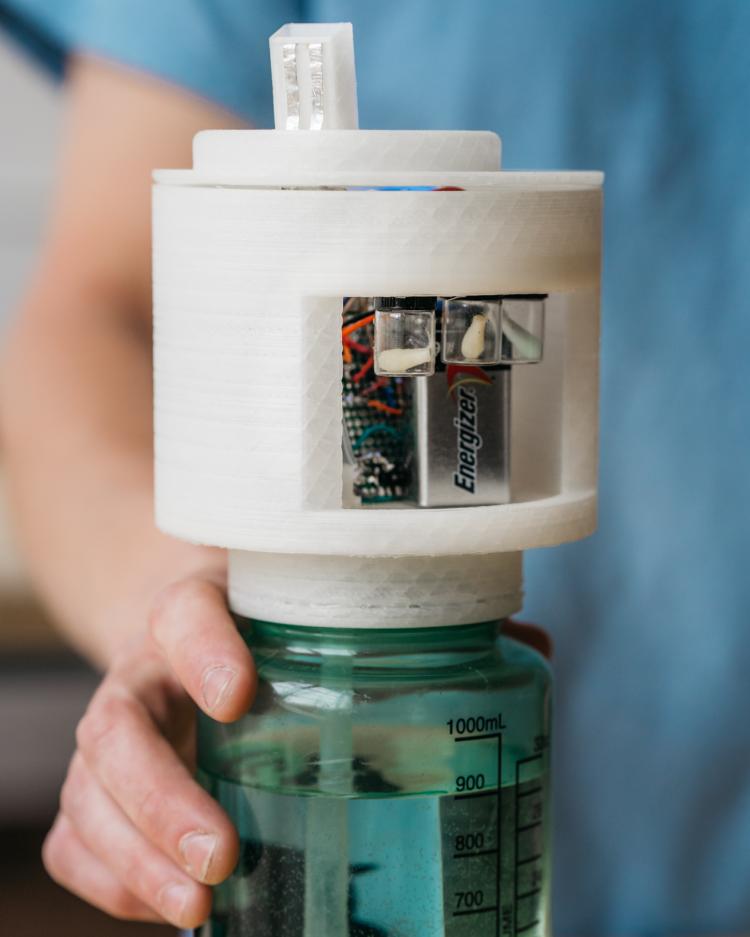CTD offers company-sponsored capstone option

There’s a new option for ATLAS seniors enrolled in Capstone—a two-semester course sequence designed to put to work the wide spectrum of skills acquired during their undergraduate careers in the Creative Technology and Design engineering major.
In past years, students developed capstone projects based on their personal interests; now they may opt to work on a challenge posed by a sponsor. The goal is to give Creative Technology and Design undergraduates practical experience while letting industry benefit from their valuable skill sets.
It’s the latest addition to a popular undergraduate engineering major that has grown to 260 students since it was launched six years ago.
“Industry-sponsored capstone projects are a great opportunity for students as well as sponsors,” says Aileen Pierce, associate director of ATLAS undergraduate programs. “Students work on real-world projects in a client-contractor relationship, and companies have the opportunity to work with creative engineering students exploring interesting and leading-edge creative technology projects.”
In a pilot program conducted during the fall 2020 and spring 2021 semesters, five sponsors successfully worked with 10 students.
Virtual tools of the trade
Monica Chairez, a first-generation college student who graduated from the CTD program in May, helped CU Dental School of Medicine develop more effective remote teaching tools during the 2020-2021 school year. She created a digital tool library, along with 3D models of teeth to improve dental student skills training, something especially helpful for remote learning during the pandemic.
“Working with the dental school was a great experience,” said Chairez, who used the open-source software program Blender to create the virtual 3D library. “It helped me understand what it would be like to work in this industry. I worked with different groups, so we needed good communication. I also learned a lot about the software. Overall, I loved this experience.”
Thomas Greany DDS, clinical assistant professor for CU’s Dental School of Medicine, said students who can’t touch and feel the instruments in class can instead virtually tumble, rotate and zoom into these instruments just as if they were holding them.
“I manipulated the tools so they look realistic, and then I applied material to it, some color, so it looks metallic like the actual tools,” said Chairez, who was drawn to the opportunity because she has an interest in medicine.
Pure sweetness
In another partnership, FlaVR Labs, a tech startup that uses virtual reality technology to intensify flavors of foods and drinks, sponsored two undergraduate CTD students’ capstone projects.
Max Kitay and Michael Morris (both BS-CTD’21) successfully developed capstone projects based on FlaVR’s technology, which uses tasting devices, such as spoons, plates and cups to deliver flavor through electrical stimulation. Professor Ellen Do, co-founder of FlaVR Lab and director of ATLAS Institute’s ACME Lab, and her co-founder, Nimesha Ranasinghe, an assistant professor in the School of Computing and Information Science at the University of Maine, and Darryl Kirsh, an investor/financial backer of FlaVR Labs, met virtually with the students every two weeks for a year to discuss project progress and tweak the progression of the products they were designing.
“We're happy with both students’ performances,” Do says. “It’s so nice to work with ATLAS capstone students. They are technically competent. They’re designers. They always come up with interesting ideas.”
“I really enjoyed working with both Max and Michael,” Ranasinghe added. “We had exciting discussions about the human perception of food and flavors and how to incorporate design and technology to augment human perception that encourages people to eat right. Both students are good designers with a ‘Let's get the job done’ attitude. They not only produced designs for us, but they also did background research to gain a better understanding of what we are designing.”
Kitay’s capstone project, the FlaVR Labs Hydration Tracking Water Bottle, encourages water consumption by making plain water taste like a flavored beverage, without the addition of chemicals, sweeteners, aromas or colors. Taste enhancement occurs digitally via a combination of electrode stimulation of the tongue, concentrated aroma release and color change of the liquid through LEDs–all tricking a person’s brain to believe they are drinking something other than water.

“The most rewarding aspect was gaining insight/feedback from professionals and getting to work alongside such interesting and intelligent people,” Kitay said.
Kirsch, of FLaVR Labs, said he was impressed with Kitay’s ability to design and deliver the project during the pandemic.
“Max really made some important design and functional contributions to a long-time project of ours,” Kirsh said. “The fact that he was able to design, produce and test during Covid and only connect with the FlaVR team digitally, is a real tribute to his ingenuity and skills.”
Morris’ project, the FlaVR Labs Interactive Eating Plate, also called “EATcosystem, encourages children who don’t eat enough calories to increase their food intake through a reward system where stars shaped by LED lights embedded in a plate light up each time food is eaten from the plate.
In 2020, FlaVR received a $50,000 grant from the National Science Foundation's Innovation Corps. The company’s founders are writing proposals to the National Institute of Health (NIH) and the Small Business Innovation Research (SBIR) to fund EATcosystem, which includes a plate, bowl and spoon that tracks people’s eating habits. Possible uses of the project include monitoring people’s eating habits, such as the speed at which they eat, or measuring the weight of food consumed.
“Michael’s work really helped us progress to a stage where we clearly see a commercial path for EATco,” says Kirsh. “He took a project that we really wouldn’t have had time to pursue and pushed it to a priority.”
With previous reporting from Debra Melani.


